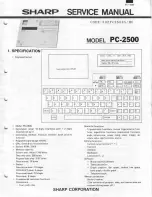
58
Reference
● ● ● ● ● ● ● ● ● ● ● ● ● ● ● ● ● ● ● ● ● ● ● ● ● ● ● ● ● ● ● ● ● ● ● ● ● ● ● ● ● ● ●
• The PSR-9000 recognizes
chords you play in the Auto
Accompaniment section of key-
board and produces appropri-
ate chords, even if auto
accompaniment is off (as long
as the Left part is set to on).
Chords are recognized accord-
ing to the Fingered mode, even
if the mode is actually set to
Single Finger or Multi Finger.
This setting is especially effec-
tive when used with the Vocal
Harmony or the Harmony/
Echo.
The auto accompaniment feature puts a full backing band at your fingertips. To use it, all you have to do is
play the chords with your left hand as you perform and the selected accompaniment style matching your
music will automatically play along, instantly following the chords you play. With auto accompaniment,
even a solo performer can enjoy playing with the backing of an entire band or orchestra.
This section explains some important functions of the auto accompaniment that are not covered in the
“Quick Guide.” For basic information on playing the auto accompaniment, refer to page 20 in the “Quick
Guide.”
Chord Fingerings
The way in which chords are played or indicated with your left hand (on the left side of the keyboard from
the Split Point) is referred to as “fingering.” There are 7 types of fingerings as described below.
For information about how to select the fingering mode, refer to page 135.
●
Single Finger
Single Finger accompaniment makes it simple to produce beautifully orchestrated accompa-
niment using major, seventh, minor and minor-seventh chords by pressing a minimum num-
ber of keys on the Auto Accompaniment section of the keyboard. The abbreviated chord
fingerings described below are used:
●
Multi Finger
The Multi Finger mode automatically detects Single Finger or Fingered chord fingerings, so
you can use either type of fingering without having to switch fingering modes.
●
Fingered
This mode lets you finger your own chords on the auto accompaniment section of the key-
board, while the PSR-9000 supplies appropriately orchestrated rhythm, bass, and chord
accompaniment in the selected style.
The Fingered mode recognizes the various chord types listed on the next page.
●
Fingered Pro
This mode is basically the same as Fingered, with the exception that more than three notes
must be played to indicate the chords. Playing the root note and its octave produces accom-
paniment based only on the root.
●
On Bass
This mode accepts the same fingerings as the Fingered mode, but the lowest note played in the
Auto Accompaniment section of the keyboard is used as the bass note, allowing you to play “on
bass” chords (in the Fingered mode the root of the chord is always used as the bass note).
●
On Bass Pro
This mode is basically the same as On Bass, with the exception that more than three notes
must be played to indicate the chords. Playing the root note and its octave produces accom-
paniment based only on the root.
●
Full Keyboard
When this advanced auto-accompaniment mode is engaged the PSR-9000 will automatically
create appropriate accompaniment while you play just about anything, anywhere on the key-
board using both hands. You don’t have to worry about specifying the accompaniment chords.
Although the Full Keyboard mode is designed to work with many songs, some arrangements
may not be suitable for use with this feature. Try playing a few simple songs in the Full Key-
board mode to get a feel for its capabilities.
AUTO
ACCOMPANIMENT
Split Point
Auto Accompaniment
section
Cm
C
Cm
7
C
7
• For a major chord, press the
root key only.
• For a seventh chord, simultaneously press
the root key and a white key to its left.
• For a minor chord, simulta-
neously press the root key and
a black key to its left.
• For a minor-seventh chord, simultaneously
press the root key and both a white and
black key to its left.
• The point on the keyboard that
separates the auto accompani-
ment section and the right-
hand section of the keyboard is
called the “split point.”
Refer to page 135 for instruc-
tions on setting the split point.
Auto Accompaniment
Quick Guide
on page 20
56
















































